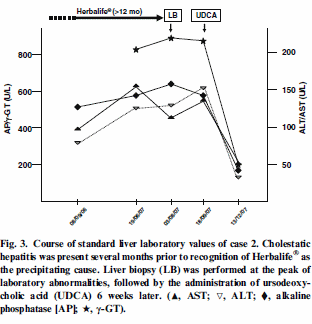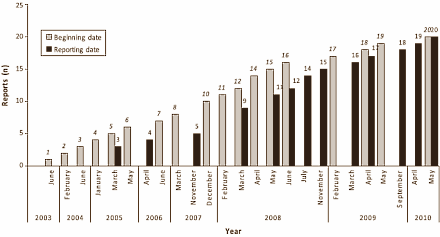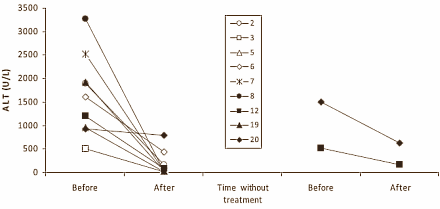Two years ago liver doctors sounded the alarm about cases of liver damage
in users of Herbalife products. They were unable to say which component
in Herbalife products was causing the liver damage, but researchers at
the University of Bern made an attempt to do so in an article published
this year in the Journal of Hepatology. They found the bacteria Bacillus subtilis in Herbalife products.

|
In the article the doctors discuss two cases of people who became ill
after using Herbalife products: a man aged 78 and a woman aged 50. The
man's urine
had turned dark brown, he had hepatitis and had been feeling unwell for
a couple of weeks. He had been using the Herbalife F1 Shake [Strawberry
and Cappuccino flavours] for three years on his daughter’s advice [she
was a Herbalife salesperson], as well as various other medicines.
According to the analyses, the man had a liver complaint. When the
doctors took him off the shake his blood values recovered, but they
deteriorated again later. The doctors gave the man corticosteroids and ursodeoxycholic acid, after which he recovered completely. You can see the fluctuations in the man’s blood values in the graph below.

The woman sold Herbalife supplements. She took half a dozen different
Herbalife supplements, including the Personalized Protein Powder Mix
Formula 3. She had stomach pain
and hepatitis and the doctors found signs of liver damage in her blood.
They got the woman to stop taking the supplements and the graph below
shows how the liver values in her blood improved.

The researchers examined samples from the livers of the man and the
woman and found signs of damage in both. The doctors turned the
supplements that the men and women had used inside out, but found no
contaminants: no heavy metals, no pesticides, no antibiotics, nothing.
But when they examined the Herbalife products for micro-organisms, they
did come across something. The meal substitutes the man and woman had
been using contained the bacteria

|
Hmm.
Honestly speaking, we’re not sure what to make of this. As far as we know, B. Subtilis is found in pretty much everything, and it’s not particularly dangerous. [Wikipedia]
Some studies even regard it as a probiotic. It would seem pretty unlikely then that B. subtilis is the cause of such serious liver damage.
-----------------------------
In 2007 liver doctors sounded the alarm about cases of liver damage in users of Herbalife products. [J Hepatol. 2007 Oct;47(4):521-6. ] [J Hepatol. 2007 Oct;47(4):514-20.]
According to researchers at the Universidad de Oviedo in Spain there
are still problems with the products. The Spaniards analysed data from
the Pharmacovigilance Centres and discovered twenty cases of liver
damage among Herbalife users.
In their article the Spanish researchers refer to the cases that were
reported in 2009 and to other more recent references that have since
cropped up in the literature. These included a case of hepatitis in a
63-year-old Argentinian woman who was using Herbalife [Acta Gastroenterol Latinoam. 2008 Dec;38(4):274-7.] and cases reported by Icelandic researchers in 2010. [Laeknabladid. 2010 Mar;96(3):167-72.]



“The lack of labeling of contents of these products renders causality assessment impossible,” they reported. But using the WHO criteria for Causality Assessment of Suspected Adverse Reactions and expert hepatopathologists blinded to the patient information of herbal use, they determined that two were certainly caused by the Herbalife products, seven cases were probably and one case possibly.
This is not the first time that Herbalife has been in the news and the target of governmental regulatory agencies and concerned medical professionals. As recently reported, it is one of the oldest multi-level marketing companies selling vitamin and herbal products promising better health and slimness. Herbalife has found it especially lucrative to take advantage of poor people in developing countries. MLM is a sales technique where people, working as independent distributors, buy sales kits and products which they sell and, in return, are promised they’ll make money from those sales as well as from a percentage of the sales of those who they recruit as new distributors. However, fewer than 1% of distributors ever earn much money and many are stuck with thousands of dollars of products. MLM and pyramid schemes are listed on many attorney generals' top ten lists of consumer complaints. At MLM Watch.org, you can read more about MLM, including a summary of complaints that have previously been submitted to the FTC on Herbalife products.
A few years ago, the National Council Against Health Fraud issued a position paper on MLM health product companies. It listed important precautions for consumers, as well as described the harm that’s come to people who’ve gotten mixed up in them. Dr. Stephen Barrett, M.D., NCAHF Vice President, examined more than 100 MLM companies offering health-related products and concluded “that every one of them has made false or misleading claims in their promotional materials.” He said:
-----------------------------
Yet more reports of liver damage from Herbalife

|
According to the Spanish researchers 30 cases of liver damage in
Herbalife users have been described in the literature. When they looked
into the Spanish pharmacological databanks they found another 20,
bringing the total now to 50.
The researchers studied the period from 2003 to 2010.
In 15 of the 20 cases the patients were not using any medicine,
therefore ruling out possible interaction between Herbalife products and
other substances which might cause liver damage.

In nine cases the researchers found measurements that doctors had made of the enzyme ALT
during after use of Herbalife products [below left]. ALT is an
indicator of liver damage. The higher the ALT level, the worse the state
of the liver. Stopping Herbalife products improved the subjects' liver
condition.

Two of the patients started to use the Herbalife products again
afterwards. In the figure above on the right you can see that their ALT
level rose again, and then fell when the patient stopped using the
products.
The researchers don't know which Herbalife products cause liver damage.
Many of the patients used Rose Ox – a supplement containing extracts of turmeric, rosemary and clove – and the protein shake Formula 1, some patients did not use these products.
As far as the Spaniards are concerned though, the matter is clear. "Our
results emphasize the need to establish further regulatory measures",
they write.
Herbalife responded several months after the Spanish study results were published. [Pharmacoepidemiol Drug Saf. 2012 Mar;21(3):333-4.]
According to Herbalife the Spanish used the wrong method when claiming
that Herbalife products were the cause of liver damage, and the
researchers themselves were dubious. "The failure to acknowledge these
assessments raises questions about the authors' scientific balance given
the serious and unsubstantiated accusations about a company's whole
product line", wrote Herbalife.
The first author of the Spanish study, Gloria Manso, is not impressed with the way Herbalife denied the research findings.
"This is perhaps an understandable attitude after the first publications
but not when after a considerable period, new cases keep being reported
and are added to the list", Manso writes. "Herbalife should, at least,
consider the possibility that some of their products can induce
hepatotoxicity in certain circumstances and should make an effort to
actively collaborate in the identification of the agents responsible."
Herbs and healthy livers

Few
consumers hear about the reports in the medical literature of liver and
other toxicities from herbal products. Dr. Leonard B. Seeff, M.D., of
the National Institutes of Health, reviewed the herbal products that have been associated with liver damage in the journal Clinical Liver Disease. His concerns about the growing numbers of medical cases were similar to an earlier 2005 comprehensive review for the European Association for the Study of the Liver in the Journal of Hepatology,
led by Dr. Felix Stickel, M.D.. These doctors reported that, depending
on the geographic region, 21% to 65% of patients seen for liver disease
have been taking herbal preparations. Most evident is that women are at
greatest risk not only because they use more herbals, but because of
their higher susceptibility to herbal- and pharmaceutical-induced liver
damage. Because many practitioners and consumers believe herbals are
safe, the doctors noted the many times patients will even continue to
take them as their liver diseases worsen.
Dr. Stickel and colleagues added:
Another
problem is that herbals are usually mixtures of several ingredients or
plants harvested during different seasons and extracted through variable
procedures, which makes the identification of both the
pharmacologically active and toxic compounds difficult. Also,
contamination of herbals with microorganisms, fungal toxins such as
aflatoxin, with pesticides, heavy metals and synthetic drugs has been
described. Interactions between herbs and chemical drugs are another
source of problems associated with the intake of herbal compounds.
While
liver damage appears infrequently, the consequences are serious enough
for patients that these cases are getting the notice of doctors. Another
article in this month’s issue of the Journal of Hepatology
by researchers at Hadassah-Hebrew University Medical Center in Israel
reported on 12 patients (11 women) with acute liver injury after using
Herbalife products. Incredibly, after three patients recovered, they
resumed taking Herbalife products and succumbed to a second bout of
hepatitis.
Another article
in the same issue reported on a study by doctors in Switzerland. They
had become concerned after seeing several patients with severe liver
damage who had been using Herbalife products and tried to determine how
prevalent liver toxicity due to Herbalife products might be. They
surveyed all departments of medicine at 121 Swiss public hospitals,
divisions of gastroenterology/hepatology, pathology and the Swiss
pharmacovigilance database and identified 10 cases of liver toxicity in
otherwise healthy people not taking any other herbal products or
medications from 1998-2004. Rigorous questioning proved necessary as
patients consistently underreported their use of herbal products, they
said. They carefully documented the cases, including obtaining liver
biopsies in most. Three of the ten patients had potentially
life-threatening liver failure requiring liver transplants.“The lack of labeling of contents of these products renders causality assessment impossible,” they reported. But using the WHO criteria for Causality Assessment of Suspected Adverse Reactions and expert hepatopathologists blinded to the patient information of herbal use, they determined that two were certainly caused by the Herbalife products, seven cases were probably and one case possibly.
This is not the first time that Herbalife has been in the news and the target of governmental regulatory agencies and concerned medical professionals. As recently reported, it is one of the oldest multi-level marketing companies selling vitamin and herbal products promising better health and slimness. Herbalife has found it especially lucrative to take advantage of poor people in developing countries. MLM is a sales technique where people, working as independent distributors, buy sales kits and products which they sell and, in return, are promised they’ll make money from those sales as well as from a percentage of the sales of those who they recruit as new distributors. However, fewer than 1% of distributors ever earn much money and many are stuck with thousands of dollars of products. MLM and pyramid schemes are listed on many attorney generals' top ten lists of consumer complaints. At MLM Watch.org, you can read more about MLM, including a summary of complaints that have previously been submitted to the FTC on Herbalife products.
A few years ago, the National Council Against Health Fraud issued a position paper on MLM health product companies. It listed important precautions for consumers, as well as described the harm that’s come to people who’ve gotten mixed up in them. Dr. Stephen Barrett, M.D., NCAHF Vice President, examined more than 100 MLM companies offering health-related products and concluded “that every one of them has made false or misleading claims in their promotional materials.” He said:
The
products promoted as remedies are either bogus, unproven or intended
for conditions that are unsuitable for self-medication...Most supplement
companies get their raw ingredients from the same bulk wholesalers and
merely repackage them...During the past several years, many physicians
have begun selling health-related multilevel products to patients in
their offices. Doctors are typically recruited with promises that the
extra income will replace income lost to managed care....During the past
20 years, more than 25 health-related MLM companies have faced
regulatory actions for false advertising, operating a pyramid scheme, or
both. Although such actions usually improve future behavior, they
rarely provide adequate redress for victims. Moreover, the number of MLM
frauds known to Federal Trade Commission vastly exceeds its capacity to
prosecute them on a case-by-case basis.
The
growing reports of life-threatening health risks among users of these
products remind us to not to be taken in by claims of magical benefits
of any dietary intervention. Beyond preventing deficiencies — which is
easily achieved by virtually everyone simply when enjoying all sorts of
foods — no food or supplement is supernatural. When we hear claims that
optimal or personalized nutrition is science-based and can improve our heart, digestive or immune health; help us age healthfully, improve our memory or eyesight, or remove wrinkles; increase our energy and fitness; or manage weight, control our appetite or boost metabolism...we know it sounds too good to be true.
The
pursuit of optimal nutrition, ‘wellness’ and slim bodies has become
fertile ground for the marketing of products, diets and regimens that
promise “a lifetime of good health.” Herbal and natural dietary and
weight loss supplements can be alluring because they may seem safe.
Three new studies, however, have documented liver toxicity among healthy
people using natural herbal supplements — more than 20 cases were just
among Herbalife customers in two small countries.

